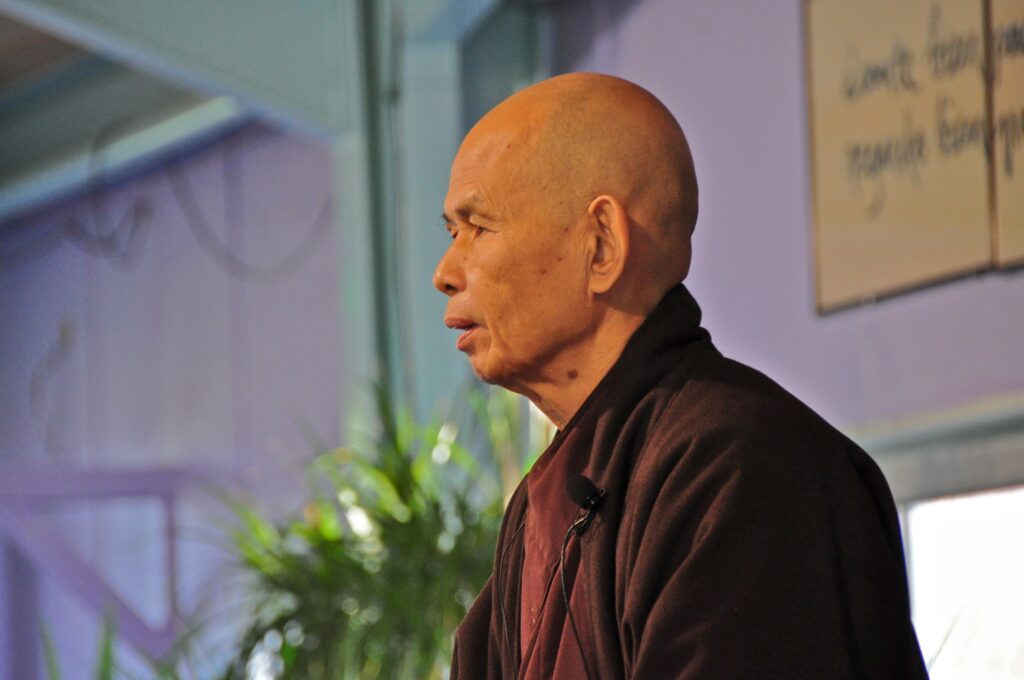Thích Nhất Hạnh

Credit: Geoff Livingston (geoliv): https://www.flickr.com/photos/geoliv/
Licence: Attribution-NoDerivs 2.0 Generic (CC BY-ND 2.0)
November 19, 2009
| Giver: | Individual |
|---|---|
| Receiver: | Individual or unstructured/informal group |
| Gift: | Voice/Advocacy |
| Approach: | Philanthropy |
| Issues: | 10. Reduced Inequalities |
| Included in: | Kindness and Generosity, Religious Giving |
Thích Nhất Hạnh (1926-2022) was a Vietnamese Buddhist monk, teacher, author and peace activist. A leading voice in the anti-war movement in the 1960s, Nhất Hạnh pioneered the practice of “engaged Buddhism,” an approach to political activism rooted in principles of mindfulness and compassion. Exiled from his native country for decades due to his political views, Nhất Hạnh created a global network of monasteries dedicated to his teachings and played a key role in helping popularize Buddhist philosophy in the West.
Nhất Hạnh received his religious instruction at Từ Hiếu Temple in Huế. In the early 1960s he founded Youth for Social Services, a relief initiative for people impacted by the war. With roughly 10,000 volunteers, the organization restored villages destroyed by airstrikes, provided aid to displaced families and built schools and medical facilities.
As the decade progressed, Nhất Hạnh became increasingly outspoken in his opposition to the war. In 1966 he traveled to Europe and the U.S., where he met with high-ranking political figures as part of a campaign for peace. In May of that year, Nhất Hạnh sat beside Dr. Martin Luther King, Jr. at a Chicago press conference where the reverend denounced U.S. involvement in Vietnam.
Nhất Hạnh’s anti-war activities eventually led the Vietnamese government to ban him from the country. He settled in France, where he formed the Buddhist Peace Delegation and later taught Buddhism at the Sorbonne. In 1982 he co-founded Plum Village, the largest Buddhist monastery in the West. His program of ethical conduct, the “Five Mindfulness Trainings,” soon began drawing thousands of attendants each year.
In the decades that followed Nhất Hạnh traveled frequently, teaching Buddhist practices to audiences throughout the world. In 2005, after nearly four decades of exile, he was granted permission to return to Vietnam. Over several visits in the mid-2000s he negotiated with the government to expand religious freedom in the country; however, the talks produced no tangible results.
Nhất Hạnh continued to teach and publish books until 2014, when a stroke left him partially paralyzed and unable to speak. In 2018 he returned to Từ Hiếu Temple, the site of his initiation into Buddhism nearly 80 years earlier. He died there four years later, on January 22, 2022.
Nhất Hạnh remains an influential figure in global Buddhism. His life’s work survives in eleven monasteries worldwide, where his disciples continue to impart his ethical teachings to new generations of adherents. With its focus on activism guided by compassion, Nhất Hạnh’s doctrine of engaged Buddhism continues to inspire peace activists to this day.
Contributors: Maha Tazi, Stephen Meyer
| Source type | Full citation | Link (DOI or URL) |
|---|---|---|
| Publication |
King, Sallie B., ed. Socially Engaged Buddhism. University of Hawaii Press, 2009. |
- |
| Publication |
Hanh, Thich Nhat. For a future to be possible: Buddhist ethics for everyday life. Parallax Press, 2007. |
- |
| Publication |
Sivaraksa, Sulak. Conflict, culture, change: Engaged Buddhism in a globalizing world. Simon and Schuster, 2015. |
- |
| Publication |
Willis, Jennifer Schwamm. “A lifetime of peace: Essential writings by and about Thich Nhat Hanh.” (2003): 330. |
- |